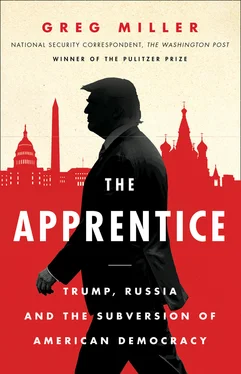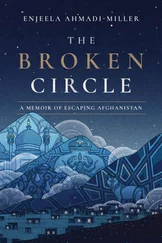Trump’s ability to see these perils was impaired by his own unfamiliarity with the norms of governance, his insecurity and narcissism. Other presidents had varying levels of these traits, but none had ever possessed such a concentrated combination. These qualities had been on display from the start of his campaign. But now, against a backdrop that symbolized the profound burden of presidential responsibility, his shortcomings seemed suddenly and gravely consequential.
In the reality show that had propelled him to great fame, Trump was depicted as a business titan with peerless instincts—a consummate negotiator, a fearless dealmaker, and an unflinching evaluator of talent who forgot nothing. Week after week, contestants competed for the chance to learn from a boardroom master—to be, as the show’s title put it, his apprentice.
In the reality that commenced with his inauguration, Trump seemed incapable of basic executive aspects of the job. His White House was consumed by dysfunction, with warring factions waiting for direction—or at least a coherent decision-making process—from the president. His outbursts sent waves of panic through the West Wing, with aides scrambling to contain the president’s anger or divine some broader mandate from the latest 140-character blast. He made rash hiring decisions, installing cabinet officials who seemed unfamiliar with the functions of their agencies, let alone their ethical and administrative requirements. Decorated public servants were subjected to tirades in the Oval Office and humiliating dress-downs in public. White House documents were littered with typos and obvious mistakes. Senior aides showed up at meetings without the requisite security clearances—and sometimes stayed anyway. Trump refused to read intelligence reports, and he grew so visibly bored during briefings that analysts took to reducing the world’s complexities to a collection of bullet points.
The supposedly accomplished mogul was the opposite of how he’d been presented on prime-time television. Now he was the one who was inexperienced, utterly unprepared, in dire need of a steadying hand. Now he was the apprentice.
The word, of course, has another connotation, one acutely relevant when it came to Donald Trump: an aspect of servility. Trump’s admiration for the leader of Russia was inexplicable and unwavering. He praised Putin, congratulated him, defended him, pursued meetings with him, and even when talking tough, fought virtually any policy or punitive measure that might displease him.
Like any trained intelligence operative, Putin understood the manipulative power of playing to someone’s insecurities and ego. On cue, he reciprocated with frequent praise for the president he had sought to install in the White House. The CIA experts in Russia House saw through these ploys, but they now worked for a president who couldn’t be persuaded of anything by an agency he believed was engaged in a plot to discredit him.
It’s hard to imagine that even a master manipulator like Putin would have anticipated the full success of his operation. Not only had he sabotaged Hillary Clinton, but he had also helped install in the Oval Office someone who—by virtue of his fragile ego, disdain for democratic norms, and volatile leadership—compounded the impact of the Russian campaign. In the months that followed Trump’s visit to CIA headquarters, his administration would be tarred by scandals political and personal, a rate of White House dismissals unparalleled in history, and investigations into possibly illegal actions by the president, his family, and his team. Trump’s decisions sometimes seemed as if they were designed to erode American effectiveness or standing, be it in government or on the world stage. Again and again he would belittle America’s closest allies—Britain, Canada, France, Germany, and Australia—all the while praising Russia’s strongman.
In so doing, Trump was extolling an authoritarian with an abysmal record on human rights. A significant number of Putin’s critics have ended up dead, most prominently Boris Nemtsov, an opposition politician who was shot multiple times as he walked near the Kremlin in 2015. Others included Natalya Estemirova, the human rights activist who was kidnapped in Chechnya and found shot in the head; Anna Politkovskaya, the crusading journalist who was shot in her apartment building as she returned home; Sergei Yushenkov, the politician who was shot while investigating a possible government role in the bombing of an apartment building; and Alexander Litvinenko, the former security services officer who died an excruciating death in Britain when his tea was laced with polonium-210, a radioactive substance. Particularly among those who had spent decades in the shadows at secret war with the USSR and then Putin’s regime, Trump’s obsequious manner was horrifying—and mystifying.
After concluding his speech, Trump was whisked out of the building and back to his car for the return trip to Washington. The CIA crowd thinned as crews began stacking chairs and breaking down risers. That week, something occurred that officials had seen only in the aftermath of a CIA tragedy. Flowers began to accumulate at the foot of the Memorial Wall on Monday, as the agency returned to work. By week’s end there was a small mound of bouquets placed by employees who passed by the stars in silence.
THIS IS THE STORY OF ONE OF THE MOST STUNNING AND ALARMING instances of political malfeasance in American history: the successful efforts of a foreign government to influence the results of a presidential election, and the president’s potential obstruction of justice after his tainted victory. What was indisputable was that a foreign government had successfully infiltrated our democracy, pushing the election toward the candidate it favored. What now also seems indisputable is that, almost immediately after the Mueller Report was submitted to Congress, Trump directly attempted to do exactly what his critics claimed he had done with Russia: cut a criminal quid pro quo deal with a foreign government to benefit his own political standing. As this book reveals, Trump campaign goings-on in the Ukraine were always key to the collusion investigation. Evidence is also mounting that just as Trump has blocked government officials from cooperating with Congress, the Mueller investigation was badly hampered by a similar White House strategy. Trump and his allies seem increasingly desperate to hide the truth about his relations with Ukraine and Russia. He would not want you to read the pages that follow.

THE GEOGRAPHY AND HISTORY OF THE NETHERLANDS—ALWAYS in the shadow of great powers—forced it to become quietly effective at espionage. And while the Dutch intelligence service, known as AIVD (which translates to General Intelligence and Security Service), cannot match the global reach of the CIA or MI6 (Britain’s Secret Intelligence Service), and its officers may never compete for screen time with Jason Bourne or James Bond, it kept its focus on Russia even as the United States was diverting intelligence resources to terrorism after the September 11 attacks.
With one of the largest and fastest internet hubs in the world, the Netherlands had become a pass-through point for cyber criminals, particularly from Eastern Europe. Dutch spies, as a result, became particularly adept at operating in cyberspace, relying on that capability to monitor online crime as well as the resurgent threat posed by Moscow. In 2014, AIVD accomplished a digital feat of David-and-Goliath proportions, the agency’s cyber unit penetrating a hacking syndicate linked to Russia’s foreign intelligence service, the SVR. The Dutch gained access not only to the group’s computer systems but to the surveillance cameras mounted above the entrance to its lair, capturing clear images of the Russian hackers as they filed into what they’d always thought was a secure space in the heart of Moscow. Analysts used the images in some cases to identify individual hackers, gradually compiling a roster with their names, the handles they used online, and grainy photos.
Читать дальше













